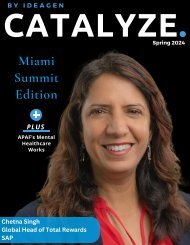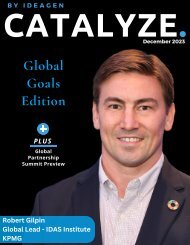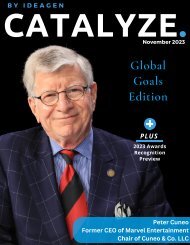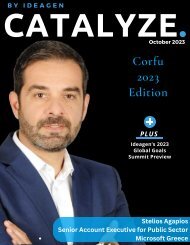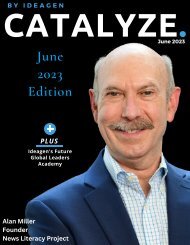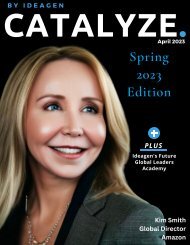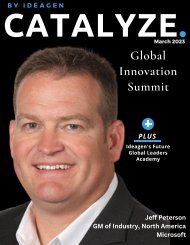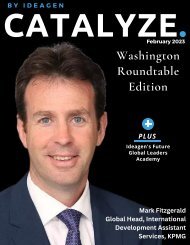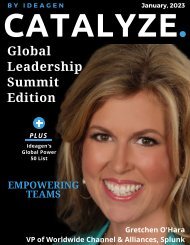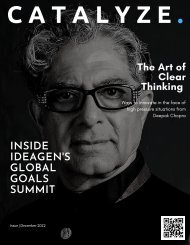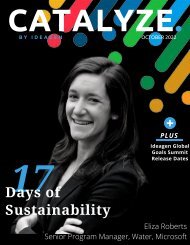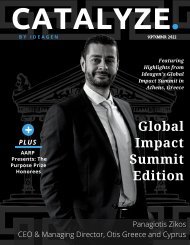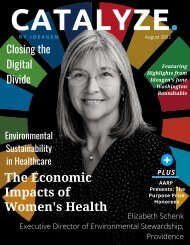Ideagen Global - Catalyze Magazine - May 2023
With Ideagen's extensive member network and influential platform, Catalyze Magazine serves as an aggregate for all the content, events, articles, and collaboration that we do. It is a monthly magazine where you will find transcriptions from Ideagen events, content, articles, and information surrounding how we are completing our mission. With this magazine, we want to highlight the nature of cross-sector collaboration and how we infuse it into our daily mission on a global scale. Ideagen's monthly Catalyze Magazine is back in 2023 with our May edition. Inside, view conversations from the 2023 Global Acceleration Summit, hosted at the Embassy of Ethiopia! This months covers features speakers: Ambassador Seleshi Bekele, Admiral James Winnefeld, Rawle Andrews Jr, Roslyn Docktor, Jean Accius, Angie Carloss, Mrudula Peddinti, Sheri Hashemi, & Sheryl Kline!
With Ideagen's extensive member network and influential platform, Catalyze Magazine serves as an aggregate for all the content, events, articles, and collaboration that we do. It is a monthly magazine where you will find transcriptions from Ideagen events, content, articles, and information surrounding how we are completing our mission. With this magazine, we want to highlight the nature of cross-sector collaboration and how we infuse it into our daily mission on a global scale.
Ideagen's monthly Catalyze Magazine is back in 2023 with our May edition. Inside, view conversations from the 2023 Global Acceleration Summit, hosted at the Embassy of Ethiopia!
This months covers features speakers: Ambassador Seleshi Bekele, Admiral James Winnefeld, Rawle Andrews Jr, Roslyn Docktor, Jean Accius, Angie Carloss, Mrudula Peddinti, Sheri Hashemi, & Sheryl Kline!
Create successful ePaper yourself
Turn your PDF publications into a flip-book with our unique Google optimized e-Paper software.
B Y I D E A G E N<br />
CATALYZE.<br />
<strong>May</strong> <strong>2023</strong><br />
<strong>Global</strong><br />
Acceleration<br />
Edition<br />
PLUS<br />
<strong>Ideagen</strong>'s Future<br />
<strong>Global</strong> Leaders<br />
Academy<br />
Ambassador Seleshi Bekele<br />
Ethiopian Ambassador to the<br />
United States
B Y I D E A G E N<br />
CATALYZE.<br />
<strong>May</strong> <strong>2023</strong><br />
<strong>Global</strong><br />
Acceleration<br />
Edition<br />
PLUS<br />
<strong>Ideagen</strong>'s Future<br />
<strong>Global</strong> Leaders<br />
Academy<br />
Admiral James "Sandy" Winnefeld<br />
Author<br />
Sailing Upwind
B Y I D E A G E N<br />
CATALYZE.<br />
<strong>May</strong> <strong>2023</strong><br />
<strong>Global</strong><br />
Acceleration<br />
Edition<br />
PLUS<br />
<strong>Ideagen</strong>'s Future<br />
<strong>Global</strong> Leaders<br />
Academy<br />
Rawle Andrews Jr.<br />
Executive Director<br />
American Psychiatric Association Foundation
Roslyn Docktor<br />
VP of Science & Technology Policy<br />
IBM<br />
B Y I D E A G E N<br />
CATALYZE.<br />
<strong>May</strong> <strong>2023</strong><br />
<strong>Global</strong><br />
Acceleration<br />
Edition<br />
PLUS<br />
<strong>Ideagen</strong>'s Future<br />
<strong>Global</strong> Leaders<br />
Academy
B Y I D E A G E N<br />
CATALYZE.<br />
<strong>May</strong> <strong>2023</strong><br />
<strong>Global</strong><br />
Acceleration<br />
Edition<br />
PLUS<br />
<strong>Ideagen</strong>'s Future<br />
<strong>Global</strong> Leaders<br />
Academy<br />
Jean Accius<br />
President & CEO<br />
Creating Healthier Communities
B Y I D E A G E N<br />
CATALYZE.<br />
<strong>Global</strong><br />
<strong>May</strong> <strong>2023</strong><br />
Accelerati0n<br />
Edition<br />
PLUS<br />
<strong>Ideagen</strong>'s Future<br />
<strong>Global</strong> Leaders<br />
Academy<br />
Angie Carloss<br />
Head of Administration,<br />
Operations, & Outreach<br />
Limbitless Solutions
B Y I D E A G E N<br />
CATALYZE.<br />
<strong>Global</strong><br />
<strong>May</strong> <strong>2023</strong><br />
Accelerati0n<br />
Edition<br />
PLUS<br />
<strong>Ideagen</strong>'s Future<br />
<strong>Global</strong> Leaders<br />
Academy<br />
Mrudula Peddinti<br />
Branding Director<br />
Limbitless Solutions
B Y I D E A G E N<br />
CATALYZE.<br />
<strong>Global</strong><br />
<strong>May</strong> <strong>2023</strong><br />
Acceleration<br />
Edition<br />
PLUS<br />
<strong>Ideagen</strong>'s Future<br />
<strong>Global</strong> Leaders<br />
Academy<br />
Sheri Hashemi<br />
Director of Engineering<br />
L3Harris
B Y I D E A G E N<br />
CATALYZE.<br />
<strong>May</strong> <strong>2023</strong><br />
<strong>Global</strong><br />
Acceleration<br />
Edition<br />
PLUS<br />
<strong>Ideagen</strong>'s Future<br />
<strong>Global</strong> Leaders<br />
Academy<br />
Sheryl Kline<br />
Executive Coach<br />
Founder & CEO<br />
The Zone Lab LLC
TABLE OF<br />
CONTENTS<br />
01 Ambassador Seleshi Bekele<br />
Ethiopian Ambassador to the United States on Ethiopia's<br />
commitments to the UN SDG's<br />
02 Admiral James "Sandy" Winnefeld<br />
Former Vice Chairman of the Joint Chiefs of Staff & Author of<br />
"Sailing Upwind"<br />
03<br />
04<br />
05<br />
06<br />
07<br />
08<br />
Rawle Andrews Jr. Esq<br />
Executive Director of the American Psychiatric Association<br />
Foundation on the components of the First Step Campaign<br />
Roslyn Docktor<br />
Vice President of Science & Technology Policy at IBM on the future<br />
of Ai in the workforce<br />
Jean Accius<br />
CEO of Creating Healthier Communities on his organizations<br />
mission and their shareholders<br />
Limbitless Solutions<br />
Head of Administration, Operations, & Outreach, Angie Carloss &<br />
Mrudula Peddinti, Branding Director at Limbitless Solutions<br />
Sheri Hashemi<br />
Director of Engineering at L3Harris discussing leading teams<br />
through communication and collaboration<br />
Sheryl Kline<br />
Executive Coach & Founder of The Zone Lab LLC on traits of<br />
leaders and developing mental toughness
E T H I O P I A ' S C O M M I T M E N T T O T H E U N<br />
S U S T A I N A B L E D E V E L O P M E N T G O A L S<br />
WITH ETHIOPIAN AMBASSADOR TO<br />
THE UNITED STATES, SELESHI BEKELE<br />
George Sifakis: You're familiar with the fact<br />
that in 2015, all 193 member states of the<br />
United Nations, including Ethiopia, voted yes;<br />
we agree on these 17 <strong>Global</strong> Goals. 17 <strong>Global</strong><br />
Goals that today we are at the midterms of, not<br />
the US in midterms, the midterms leading up to<br />
achieve these goals. Secretary Guterres recently<br />
said, 'It's a steep hill we're climbing to help<br />
achieve these goals.' But yet, what is inspiring<br />
today is that Ethiopia is helping to lead the way<br />
in all the areas you talked about agriculture,<br />
health, etc, to achieve the goals. Please briefly<br />
tell us about what you see as that model for<br />
success in helping to achieve the global goals in<br />
Ethiopia.<br />
Ambassador Seleshi Bekele: Yes,<br />
incidentally, I was at the United Nations when<br />
the SDGs were designed in the Sustainable<br />
Development Department. I know about these;<br />
the 17 goals are well formulated. It is a<br />
succession of the Millennium development<br />
goals. It cuts across 17 goals, with 16 related to<br />
specific actions that must be accomplished, the<br />
17th on partnerships.<br />
Ambassador Bekele: Ethiopia has shown the way<br />
in several key areas. Number one, the overall<br />
growth of GDP and service sectors are increasing<br />
significantly. In poverty reduction, immense work<br />
is ongoing, especially in an agricultural area<br />
where a majority of people live in rural areas<br />
within the agriculture economy, which means you<br />
have to improve the production and productivity<br />
of agriculture. Our recent success, which really<br />
plays well to the SDGs, is the summer wheat<br />
production in which Ethiopia used to import<br />
wheat to the tune of about $1 billion a year.<br />
Now we have satisfied our needs and can export<br />
through an increase in production, an<br />
intensification of agriculture, the use of irrigation,<br />
and so on, producing not only once but three times<br />
a year. It increases the volume of the yield and the<br />
production volume. Production and productivity<br />
have increased, not only in wheat but also in other<br />
areas. For example, rice has been introduced into<br />
Ethiopia, and that is successful as well. We are<br />
increasing our coffee production to provide the<br />
most delicious coffee to the world.<br />
.<br />
CATALYZE MAGAZINE | 1
A M B A S S A D O R S E L E S H I<br />
B E K E L E C O N T I U E D<br />
George: The best coffee in the world. Yes, this<br />
is a fact.<br />
Ambassador Bekele: We have to also increase<br />
production productivity and deliver to the global<br />
market. Related to that, maintaining and<br />
protecting the environment as related to<br />
development goals and climate change. Life<br />
above water, underwater, as well as those<br />
ecosystems. We are doing extremely well there.<br />
If the world could do what we are doing in<br />
Ethiopia, I think we can reverse climate change.<br />
Every year, at least 5 billion new tree seedlings<br />
are planted. All the Ethiopians are involved.<br />
Over the last four years, we've planted 28 billion<br />
trees.<br />
George: 28 Billion?<br />
.<br />
Ambassador Bekele and other <strong>Global</strong> Acceleration<br />
Summit Speakers<br />
<strong>Ideagen</strong> CEO George Sifakis & Ethiopian<br />
Ambassador Seleshi Bekele<br />
Ambassador Bekele: Yes, 28 billion. It<br />
reverses degradation number one, it can<br />
sequester carbon, and it can be used as food<br />
because some of the production of the<br />
planted trees are agroforestry, which means<br />
fruits can be harvested and then can<br />
supplement society. Additionally, some are<br />
exported now, producing mango, avocado,<br />
even bananas, and these are really improving<br />
the production system. In the energy sector,<br />
in relation to the reform, we have almost a<br />
97.5% renewable energy rate. We are<br />
utilizing renewable energy largely from<br />
hydro but also from wind and solar. The<br />
world is struggling to reach 50% renewable,<br />
but ours is much higher, and it means the<br />
roots of climate change, mitigation, and<br />
sustainability are also doing very well.<br />
CATALYZE MAGAZINE | 2
A M B A S S A D O R S E L E S H I B E K E L E<br />
F I N A L<br />
Ambassador Bekele: We have challenges because of climate change. Frequent droughts and<br />
floods are still remaining challenges, but for those, there are solutions. Adaptation solutions, for<br />
example, in drought-prone areas, we are embarking on climate-resilient wash, water supply,<br />
sanitation, and hygiene systems where we can dig deeply into the boreholes to take water and<br />
transmit it where it is needed. That deep well means it will not be easily affected by frequent<br />
droughts and annual variations. A long-term drought can affect it, but the vulnerability due to<br />
annual episodes can be overcome. For that, we need capital. We need good partnerships where<br />
advanced countries provide resources for developing economies to overcome and tackle the<br />
adaptation of climate change. We are moving on these issues. .<br />
<strong>Ideagen</strong> Africa Chair Dr. Solomon Hailemichael with<br />
Ambassador Bekele<br />
<strong>Ideagen</strong> CEO George Sifakis Interviews<br />
Ambassador Bekele<br />
CATALYZE MAGAZINE | 3
A D M I R A L J A M E S<br />
" S A N D Y " W I N N E F E L D<br />
A U T H O R , S A I L I N G U P W I N D<br />
Sailing Upwind<br />
George Sifakis: What inspired you to write<br />
Sailing Upwind?<br />
Admiral James Winnefeld: Well, I left the<br />
Navy in 2015, and as I left, my father told<br />
me, you need to gather all the information,<br />
all the things that you've done during your<br />
career because it's been an interesting<br />
career. Write it all down as an effort to<br />
maybe entertain a little bit, but mostly to try<br />
to help prepare another generation for their<br />
leadership roles. I somewhat reluctantly<br />
started writing one chapter at a time when<br />
I'd be flying somewhere on an airliner<br />
because I retired in 2015 and have been in<br />
business ever since, and that's really when it<br />
came together. It's a combination of memoir<br />
and presenting a leadership framework<br />
because I believe learning about leadership<br />
is about study, meaning reading. It's about<br />
observation. Observing other leaders, both<br />
good leaders and not-so-good leaders. Then<br />
actually running to the sound of the guns<br />
and doing leadership yourself. So I felt that<br />
in the process of learning, it's good to have<br />
a framework on which to hang your<br />
knowledge.<br />
"Sailing Upwind," by Admiral James<br />
"Sandy" Winnefeld<br />
Admiral Winnefeld: I've<br />
developed a framework of five<br />
anchors, which are leading<br />
yourself, leading people, leading<br />
organizations, leading execution,<br />
and leading change. Those appear<br />
as vignettes throughout the book in<br />
every third chapter. It was a great<br />
joy to write, and I'm very pleased<br />
that it seems to be fairly popular at<br />
the moment. But more importantly,<br />
I want to be able to give younger<br />
generations, as my father pointed<br />
out, something to hang their<br />
knowledge on as they grow and<br />
learn in this lifelong journey of<br />
learning about leadership.<br />
CATALYZE MAGAZINE | 4
S A I L I N G U P W I N D<br />
C O N T I N U E D<br />
George: That's right; a lifelong journey of leadership. I believe, and I'm sure you do<br />
as well, as you've mentioned your dad already in this interview; we all stand on the<br />
shoulders of giants. Who are some of those giants and leaders you've looked up to in<br />
your life that have truly helped shape the man you are today?<br />
Admiral Winnefeld: Well, as you alluded, I'd start with my father, who was a<br />
towering example of integrity and service, two things that he believed in very<br />
deeply. As a kid, you hear that and don't necessarily understand it. But if you hear<br />
it often enough and start to think about it, you say, okay, there's something to this<br />
integrity and service piece. Then I would say throughout my career, there are a<br />
host of people you've never heard of, but I learned from every single one of them.<br />
Mostly really good leaders, and some not-so-good leaders, but you can learn from<br />
both.<br />
One I would point out in particular, I had a wonderful opportunity to serve for one<br />
year as Colin Powell's aide de camp when he was the chairman of the Joint Chiefs<br />
of Staff, and that was about enough time because you don't want to be an aide too<br />
long. But what a fantastic learning opportunity from a truly thoughtful, generous,<br />
and strategic thinker; just a very impressive human being. I learned a lot about<br />
leadership from him. One of the most profound things he ever told me was very<br />
simple. We were riding in the car one day, and he said, 'You know, Sandy, the<br />
essence of leading people is holding them to the highest possible standards while<br />
you take the best possible care of them.' And that seems so simple, but when you<br />
think about it, it's very profound. And if you do one and not the other, it doesn't<br />
work. But if you do both of them at the same time, it's magic. That's stuck with<br />
me for a long time.<br />
CATALYZE MAGAZINE | 5
I D E A G E N G L O B A L<br />
P R E S E N T S<br />
<strong>2023</strong><br />
GLOBAL<br />
ACCELERATION<br />
SUMMIT<br />
A S S E S S I N G T H E P R O G R E S S O F T H E U N<br />
S D G ' S A T T H E M I D W A Y P O I N T T O 2 0 2 3<br />
H O S T E D A T T H E E M B A S S Y O F E T H I O P I A<br />
N O W S T R E A M I N G O N I D E A G E N<br />
<strong>Ideagen</strong>global.com | Presented <strong>Global</strong>ly by<br />
CATALYZE MAGAZINE | 6
THE THREE COMP0NENTS OF<br />
THE FIRST STEP CAMPAIGN<br />
WITH RAWLE ANDREWS JR., EXECUTIVE DIRECTOR<br />
AMERICAN PSYCHIATRIC ASSOCIATION FOUNDATION<br />
George Sifakis interviews Rawle Andrews Jr.<br />
George Sifakis: How do you balance the short-term with the long-term to help<br />
achieve the ultimate goal?<br />
Rawle Andrews Jr: It's in the components of the First step Campaign, and I have<br />
to say it's funny because there is more than one component to the first step. The<br />
three steps or components of The First Step are awareness, behavior, and attitude.<br />
When we talk about awareness, we're not just talking about being aware that<br />
mental health matters or that mental health care works. What we're talking about<br />
is depression, anxiety, and PTSD. These are treatable conditions, just like<br />
diabetes, so we're going to spend time in the first component just talking about<br />
treatability.<br />
CATALYZE MAGAZINE | 7
THE THREE COMP0NENTS OF THE<br />
FIRST STEP CAMPAIGN CONTINUED<br />
Rawle: When we get to component two, we're talking about behavior. Now that you<br />
know it's treatable, what we're saying is, talk to any healthcare provider that you trust,<br />
and that might include non-medical doctors. It could be just a nurse who's in your family<br />
that could help put you on a journey. It might be a faith leader that helps put you on the<br />
journey to get you connected to a healthcare provider. Lastly, when it comes to attitude,<br />
we hope the conclusion or the capstone of this campaign is 'There is no health without<br />
mental health.' Period. Full stop.<br />
George: There is no health without mental health. What an incredibly powerful statement.<br />
You've got volunteers, you've got individual citizens, you've got all these key components that<br />
play such a vital role within your organization. How can these volunteers and individual<br />
citizens help move the needle to achieve your goal?<br />
Rawle: I want them to start with our end in mind, 'There is no health without mental health.'<br />
Then help steer folks in their own communities to the resources we're unveiling and building in<br />
the First Step campaign. I think the other thing we have to do is just like when we board an<br />
airplane and the first thing they say is, if you're on the plane with somebody else, put your<br />
mask on first and then help others. What we want to do and what you and I have to model is, if<br />
people don't see Rawle and George taking the first step, why should they? So what we're going<br />
to do is create a pledge card program, and we're not going to ask people how they took the first<br />
step, but we're going to have tens of thousands, if not millions, of people signing electronic<br />
cards that say, 'I took the first step.' We're going to work with Big Brothers and Big Sisters,<br />
Boy Scouts and Girl Scouts saying, 'We took the first step.'<br />
We just signed an MOU with an organization called Athletes for Hope, and Athletes for Hope<br />
was founded by Muhammad Ali, Mia Hamm, and Andre Agassi. We're working on college<br />
campuses right now with student-athletes trying to make it work around the demands in<br />
performance, anxiety, performance in the classroom, NIL deals, all these things, plus life.<br />
What athletes are telling us is for them to take the first step, you have to stop seeing us as<br />
heroes and start seeing us as human beings. It's all about reevaluating and reexamining our<br />
humanity. You're a human being. I'm a human being. How come we're not acting like it? Let's<br />
act like human beings, and we'll get better health outcomes because of it.<br />
CATALYZE MAGAZINE | 8
HARNESSING AI IN THE WORKFORCE<br />
AND CLOSING THE DIGITAL DIVIDE<br />
WITH ROSLYN DOCKTOR, VP OF SCIENCE<br />
& TECHNOLOGY POLICY AT IBM<br />
George Sifakis: Shifting gears a bit to AI<br />
and the prospect, the potential of job<br />
losses, what would you say to those that<br />
say there will be a lot of lost jobs because<br />
of AI?<br />
Roslyn Docktor: I would say what our<br />
customers say. We work with a company<br />
in Pittsburgh that is a food chain. And<br />
they saved 2000 man-hours in one year by<br />
using AI to automate sales and<br />
administrative back-office processes<br />
Roslyn Docktor, IBM<br />
The same people who used to spend 2000 times doing manual labor that<br />
wasn't increasing the brand or helping them get closer to the customer<br />
can now go out in the field. Now they get to visit their regional offices,<br />
their restaurants, where their customers are, and get feedback driving<br />
innovation for their menu. What I can do is help tailor and customize<br />
experiences so that we all can benefit and be part of the AI as opposed to<br />
AI taking over jobs. What we say is AI won't replace your job, but those<br />
who know and can benefit from AI will be the job leaders of the future. If<br />
you don't know AI, you might lose your job, but not because of AI.<br />
CATALYZE MAGAZINE | 9
ROSLYN DOCKTOR CONTINUED<br />
George: Incredible, and I'd like to take it to the next level. We're sitting, as I<br />
mentioned, at the Embassy of Ethiopia here in Washington, DC,<br />
technically on foreign soil. When you think about the digital divide, which<br />
AI and other forms of technology could accelerate, how do you feel about<br />
that? What does the future look like, how do we bridge that gap, and where<br />
are we going?<br />
Roslyn: I actually see AI as a great tool to help democratize data. I see it as<br />
a tool to help bridge the divide, not further accentuate it. We do have to<br />
worry about bias and ensure that the data we use does not perpetuate<br />
historical systemic racism, and there's a lot of work going on in that space.<br />
IBM has free tools people can use, like AI 360, to make sure that you<br />
eliminate bias and know about it in advance. But when you look at a<br />
country like Ethiopia or across the globe, and it's an honor to be sitting<br />
here in the embassy today, there are so many opportunities that AI can<br />
provide to democratize access.<br />
George Sifakis & Roslyn Docktor<br />
George Sifakis interviews Roslyn Docktor<br />
CATALYZE MAGAZINE | 10
ROSLYN DOCKTOR FINAL<br />
Roslyn: What I can do is give the data and the insight to help countries<br />
know where to prioritize work. What is working? Let me give an<br />
example. In the healthcare space, cancer is a disease that affects too<br />
many of us and takes lives way too prematurely. Most clinical trials are<br />
represented by a single ethnicity. We don't have enough people doing<br />
clinical trials. If you use AI, and we at IBM have shown this, to select<br />
and help get more people into clinical trials, you can increase the<br />
diversity and number of people participating. That is just about one<br />
example of how AI can help democratize access and have results that<br />
benefit more humans.<br />
CATALYZE MAGAZINE | 11
<strong>Ideagen</strong> Thanks the Embassy of Ethiopia<br />
For Hosting The <strong>Global</strong> Acceleration<br />
Summit!<br />
CATALYZE MAGAZINE | 12
THE KEY STAKEHOLDERS FOR CREATING<br />
HEALTHIER COMMUNITIES<br />
JEAN ACCIUS<br />
PRESIDENT & CEO<br />
CREATING HEALTHIER COMMUNITIES<br />
George Sifakis: Who are your<br />
key stakeholders at Creating<br />
Healthier Communities?<br />
Jean Accius: That is another<br />
excellent question. Our key<br />
stakeholders are the communities<br />
that have permitted us to join<br />
them in creating healthier<br />
communities. It is the businesses<br />
that are anchored institutions. It<br />
is the health systems that are<br />
anchored institutions. It is the<br />
community health centers; it is<br />
the nonprofit organizations in the<br />
local communities that are trying<br />
each and every day to create an<br />
ecosystem where everyone can<br />
have an opportunity to live a<br />
longer, healthier, more<br />
productive life. If I tell you,<br />
George, that we see a huge gap,<br />
both in terms of exactly how long<br />
people live and how healthy<br />
those additional years are<br />
Jean Accius: CEO, Creating Healthier<br />
Communities<br />
Jean: That is a global trend. It's<br />
one thing to see life expectancy<br />
increase in some countries, we've<br />
seen a decline in the US by two<br />
years, but it's one thing to see life<br />
expectancy increase. However,<br />
the question is, what is the<br />
quality of those additional years?<br />
It doesn't matter if you're in the<br />
United States or if you are in<br />
another country. There is this<br />
gap, this gap that impacts<br />
government, communities, and<br />
businesses. That is something<br />
we're working very closely with<br />
communities in the driver's seat<br />
to solve.<br />
CATALYZE MAGAZINE | 13
THE KEY STAKEHOLDERS FOR CREATING<br />
HEALTHIER COMMUNITIES PT. 2<br />
George: And this is a communityby-community<br />
initiative, right?<br />
Not every community is the same.<br />
Jean: That's exactly right.<br />
George: But would it also be<br />
true that a lot of the lessons<br />
learned are shared and then can<br />
be applied?<br />
Jean Accius & George Sifakis<br />
Jean: That is exactly right. Every community has its composition. And<br />
what we like to say at Creating Healthier Communities is that we need to<br />
be invited in, and then we want to co-create solutions with communities to<br />
solve their problems. And the ROI for us is, are these communities better<br />
off solving their own problems as a result of our engagement? Our<br />
businesses, nonprofits, health systems, and other community organizations<br />
coming together in a collective fashion to identify, what are the<br />
opportunities to close those social drivers of health, and what are the<br />
economic implications of not doing so. It's taking those lessons from each<br />
community and being able to bring those ideas, solutions, practices, and<br />
models to scale.<br />
Jean Accius & Rawle Andrews Jr.<br />
George & Adriana Sifkakis with Jean, Rawle, &<br />
Solomon<br />
CATALYZE MAGAZINE | 14
Director of Product Marketing at Microsoft,<br />
Grace Clack, outlines the progress made from<br />
Microsoft's sustainability journey and the<br />
lessons learned to improve in <strong>2023</strong>.<br />
<br />
By utilizing data to understand the impacts of<br />
their initiatives and developing partnerships<br />
with like-minded organizations, Microsoft's<br />
sustainability commitments are generating<br />
impact within communities and creating<br />
competitive advantages.<br />
Grace Clack<br />
Director of Product Marketing<br />
Microsoft<br />
To read Grace's full blog post, click the link below!<br />
CATALYZE MAGAZINE | 15
LIMBITLESS SOLUTIONS MISSION &<br />
IMPACT<br />
FEATURING MRUDULA PEDDINTI, BRANDING DIRECTOR, & ANGIE CARLOSS<br />
HEAD OF ADMINISTRATION, OPERATIONS, & OUTREACH AT LIMBITLESS<br />
SOLUTIONS<br />
George Sifakis: What is it that Limbitless Solutions<br />
does, and what is your mission?<br />
Mrudula Peddinti: Limbitless Solutions is a nonprofit<br />
based out of the University of Central Florida, which<br />
we'll talk about more later on, and we create accessible<br />
technology. The core of our mission is about<br />
empowering individuals with accessible technology,<br />
whether by creating the technology to make their lives<br />
easier or just giving them access to the technology in<br />
the first place through reducing costs or partnerships.<br />
Mrudula Peddinti<br />
Angie Carloss<br />
Mrudula: The main area we focus on for our<br />
technology is children, who often struggle most<br />
getting access to these types of devices. Not only do<br />
we talk about access and cost, but also<br />
customization. As you can see here, the children get<br />
to customize what the prosthetic looks like. It's an<br />
extension of their identity, and that's how we like to<br />
discuss it. Oftentimes, people don't think about<br />
how this helps them form their identity in a society<br />
that tells them they are not enough because of their<br />
limb difference.<br />
CATALYZE MAGAZINE | 16
LIMBITLESS SOLUTIONS MISSION & IMPACT<br />
CONTINUED<br />
Mrudula: That's the broader goal for us through our other initiatives. In our<br />
undergraduate student program and K through 12 outreach, we educate<br />
people on changing the stigma around disability and limb differences. There's<br />
nothing wrong with you if you have a disability or a limb difference, you are<br />
just as important as anyone else in the room, and you have just as much of an<br />
important voice to contribute to society that way.<br />
George: How powerful is that? Would you kindly share a specific success<br />
story from Limbitless that has stuck with you?<br />
Angie Carloss: For me, it's empowerment. We have met so many bionic kids<br />
and seen how it's changed their outlook. I had one girl, and we were taking<br />
pictures of her, and she walked over and said, 'Well what do the pretty girls<br />
do?' And she was absolutely beautiful and perfect before she ever got a bionic<br />
arm, but for her, it unlocked her ability to see her own beauty. And that<br />
empowerment is why we do what we do.<br />
Mrudula & Angie presenting their bionic arm to<br />
Ambassador Bekele<br />
Rawle Andrews Jr & Jean Accius<br />
observing Limbitless's bionic arm<br />
CATALYZE MAGAZINE | 17
LIMBITLESS SOLUTIONS MISSION & IMPACT<br />
FINAL<br />
George: You know, that's incredible. And so, what are some of the future<br />
goals for Limbitless Solutions that you're particularly excited about?<br />
Mrudula: As we mentioned earlier, FDA approval is a big goal of ours<br />
because when we get this device approved, that unlocks the doors holding us<br />
back from making this device accessible to even more children across the<br />
entire country. Additionally, partnerships like this platform unlock us to get<br />
this even further across the globe to children who need access to devices in<br />
general, especially those who've suffered trauma like that in war zones and<br />
other vulnerable areas. That's our far future goal, and it starts here. To get<br />
more hospital partnerships, which is how we give the arm out, to get the data<br />
that we need to get the device approved, and to get hospitals and doctors<br />
involved to give this technology to the children that need it across the<br />
country.<br />
CATALYZE MAGAZINE | 18
LEADING TEAMS THROUGH<br />
COMMUNICATION &<br />
COLLABORTION<br />
SHERI HASHEMI<br />
DIRECTOR OF ENGINEERING, L3HARRIS<br />
George Sifakis: How do you lead your team<br />
to remain competitive, at minimum, when it<br />
comes to communications technology?<br />
Sheri Hashemi: I think it's empowerment. I<br />
think it's honing in on the value of<br />
individuals. We all want to be valued. We all<br />
have our values which we contribute to<br />
teams. I think being able to refine and hone<br />
in on the values of individuals and then being<br />
able to build off of that and empower them. I<br />
think the biggest piece is your voice and<br />
being able to speak up. To create spaces<br />
where individuals feel comfortable. Say you<br />
have ten people, you're going to have 1 or 2<br />
people who are always going to speak up,<br />
and that's great, we need their voice, but there<br />
are some folks at the table who may or may<br />
not speak up.<br />
Sheri: You want to create an<br />
environment where they feel<br />
comfortable, empowered, and excited<br />
about hearing what there is to say.<br />
There are always those who probably<br />
won't ever speak up at the table, but I<br />
think figuring out how to get all ten<br />
voices and create that open<br />
environment is crucial. Getting every<br />
single voice because there's value in<br />
what they have to say.<br />
George Sifakis interviews Sheri Hashemi<br />
CATALYZE MAGAZINE | 19
LEADING TEAMS THROUGH<br />
COMMUNICATION &<br />
COLLABORTION PT. 2<br />
George: That's right. And so collaboration, you are an expert communicator, and you<br />
believe in collaboration. How important is collaboration in your work?<br />
Sheri: It's critical. It's a cornerstone. There are complex systems, whether it be a school<br />
project, a work project, or even a community project. There are complex systems, and if<br />
you don't have that level of collaboration, you're going to be very limited in your data set.<br />
To strengthen your outcome and results, you need to have all the data and inputs<br />
available. Having collaboration ensures that you get a complete set of information to<br />
achieve your end goals and get the results you're after. I think that's how we start seeing<br />
the takeaways to show progress toward meeting 2030.<br />
CATALYZE MAGAZINE | 20
Join <strong>Ideagen</strong> and Summer Discovery July 23 to<br />
August 4th for the Future <strong>Global</strong> Leaders<br />
Academy!<br />
Future <strong>Global</strong> Leaders Academy<br />
Presented by <strong>Ideagen</strong>®<br />
Hosted at Barnard, Columbia University in New York City, The<br />
Future <strong>Global</strong> Leaders Academy brings students aged 14-18<br />
from across the globe to engage in hands-on projects that will<br />
tackle the United Nation’s 17 Sustainable Development Goals<br />
established in 2015<br />
Visit the Summer Discovery course page below to learn more<br />
CATALYZE MAGAZINE | 21
G L O B A L<br />
Traits of Leaders &<br />
Developing Mental<br />
Toughness<br />
Sheryl Kline<br />
Executive Coach, Founder<br />
The Zone Lab LLC<br />
George Sifakis: You've interviewed, you've worked with, you've helped mentor and<br />
coach so many leaders, so many female leaders. What are those key traits that you've seen<br />
time and time again that make for a very successful leader?<br />
Sheryl Kline: Well, that question is twofold. One is that these leaders care very deeply<br />
about their people. They are aware of the bottom line, but they care very deeply about<br />
their people. One thing that I have noticed also is that they're already confident. They're<br />
already amazing leaders. They've been in business for 20, 25 years. But something<br />
incredibly challenging that I have noticed consistently is sometimes they're not being<br />
heard, valued, or respected enough by their leadership and board. That's why my business<br />
has taken a little bit of a 90-degree turn and why I've been studying the last 2 to 3 years of<br />
FBI hostage negotiations, so I make sure they are prepared and that they are being heard,<br />
valued, respected, even more, and that they can lead their leaders and lead their board to<br />
do the right thing.<br />
George: It takes a certain level of mental toughness to succeed in business or anything<br />
challenging. You need to develop that level of mental toughness where you stay focused<br />
and don't get thrown off or taken off the mark you're seeking to achieve. How do you even<br />
begin to develop that mental toughness?<br />
CATALYZE MAGAZINE | 22
T R A I T S O F L E A D E R S & D E V E L O P I N G<br />
M E N T A L T O U G H N E S S<br />
Sheryl: That's an interesting question because a lot of times, people will assume that<br />
other people are mentally tough, and sometimes this gets tied into confidence as well, but<br />
there are tools. There's a proven process that's a little bit beyond the scope of our<br />
conversation today, and if anyone wants more details, I'm glad to share, but there's a<br />
proven process that takes into consideration how to help individuals become emotionally<br />
agile. It also has to do with monitoring what is going on in your mind because whenever<br />
you're in any type of crucial conversation or negotiation, which most things are<br />
negotiations these days, whatever you're thinking in your mind comes out of your mouth.<br />
In other words, it comes out in terms of your tone, gestures, and the cadence of your<br />
words.<br />
Mental toughness is something that is learned, and people can follow a proven process to<br />
create it, but they also have to have experiences of success. They have to know how to, I<br />
like to say, and I love the word you have in the name of your magazine, '<strong>Catalyze</strong>.' I need<br />
to know how to catalyze quote-unquote failures, learn from them, and build a mental<br />
toughness muscle based on experiences and a proven process.<br />
*To contact Sheryl or to get on the waitlist for her upcoming enterprise program, Fearless<br />
Female Leadership: A revolution for the return of feminine power and influence, please contact<br />
info@sherylkline.com.*<br />
CATALYZE MAGAZINE | 23
CATALYZE MAGAZINE | 24
Editor's Note<br />
Dear Friends and Colleagues, as we approach Summer <strong>2023</strong>,<br />
there are numerous positive trends and advancements to be<br />
optimistic about. From breakthroughs in technology to<br />
inspiring advancements in sustainability, it's an exciting time.<br />
We are seeing communities come together in new ways with a<br />
renewed focus on changing the world. The world continues to<br />
evolve, with AI and virtual experiences becoming increasingly<br />
accessible and diverse, including the latest from ChatGPT and<br />
OpenAI.<br />
As we move into Summer, it's important to celebrate these<br />
advancements and continue to strive toward a brighter future.<br />
At <strong>Catalyze</strong> <strong>Magazine</strong> by <strong>Ideagen</strong> <strong>Global</strong>, we are thrilled to be<br />
a part of this positive movement and can't wait to share all the<br />
exciting developments with our readers for <strong>2023</strong> and into 2024!<br />
GEORGE SIFAKIS<br />
GEORGE SIFAKIS<br />
Editor-in-Chief & CEO<br />
-<strong>Ideagen</strong><br />
CATALYZE MAGAZINE | 25<br />
DANIEL KERNS<br />
Senior Editor <br />
ALEXA SIFAKIS<br />
Publication Co-Editor<br />
Pictured Top to Bottom<br />
George Sifakis & Rawle Andrews Jr.<br />
Craig Cookson, ACC<br />
Nasdaq Board Times Square




